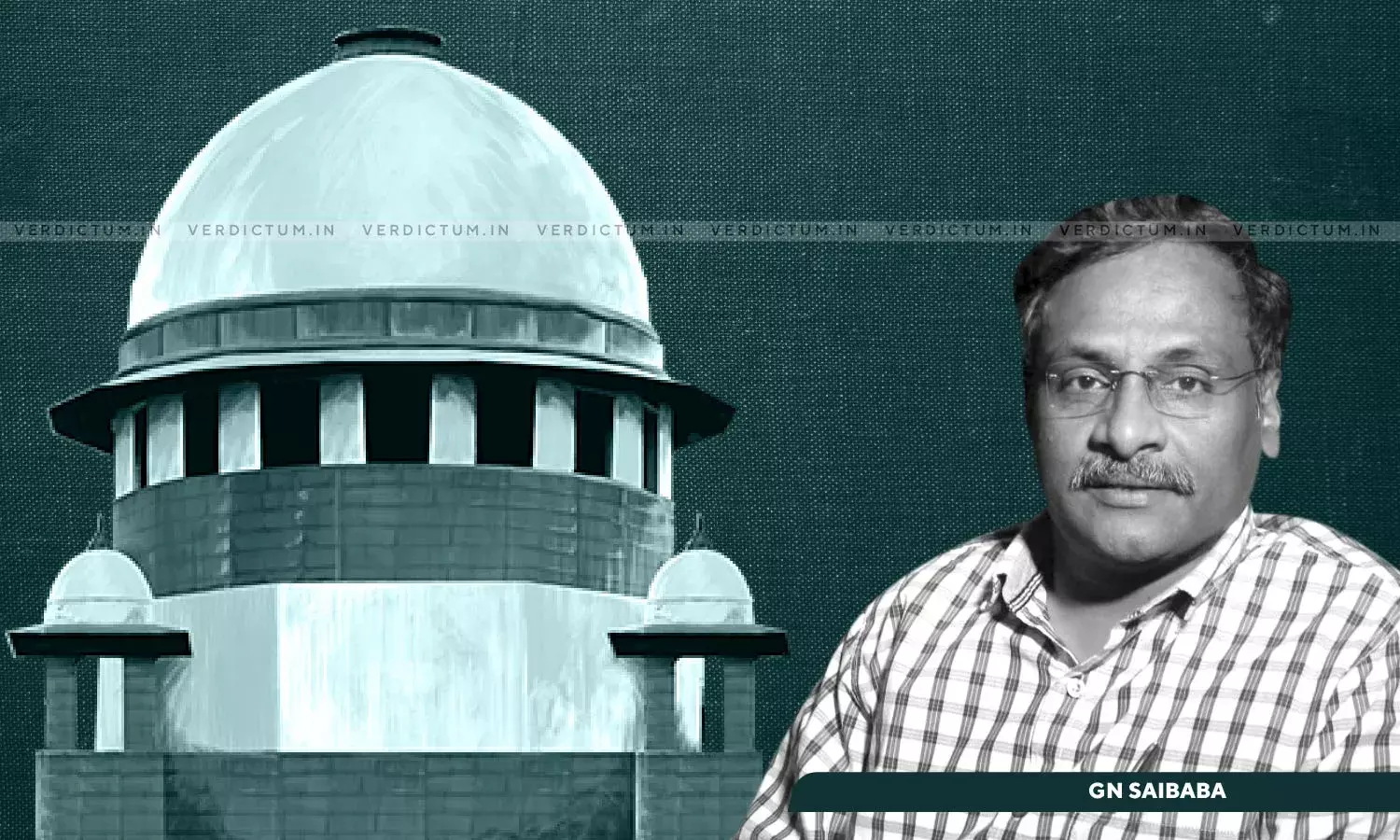Prima Facie Well Reasoned: SC Refuses To Stay Bombay HC's Judgment Acquitting GN Saibaba In Maoist-Link Case, Admits State's Appeal

While noting that the judgment is prima facie well-reasoned, the Supreme Court today rejected the State of Maharashtra's application seeking a stay of the Bombay High Court's order acquitting former Delhi University professor G. N. Saibaba and others in the Maoist links case.
The State of Maharashtra has moved the Apex Court challenging the Bombay High Court's acquitting Saibaba and others in the case. The High Court had by an earlier judgment of October 2022, acquitted the accused. The said order of October 2022 was challenged before the Supreme Court and the Supreme Court in April 2023 directed the High Court to hear the matter afresh. After hearing the matter afresh, the High Court once again acquitted Saibaba.
The Bench of Justice B.R. Gavai and Justice Sandeep Mehta, however, admitted the Appeal filed by the State.
During the hearing, Additional Solicitor General (ASG) SV Raju appeared for the State of Maharashtra and submitted, "My lords may grant me leave and give a short date."
Justice Gavai said, "Why a short date? Let it come in due course, you apply for early hearing. There are two orders of acquittal by two different Benches."
ASG Raju responded, "I'll ask for liberty if necessary."
"Prima Facie, we find that the judgment is very well-reasonable, but since it is a reversal and on earlier occasion this court had interfered, Otherwise, it is a very well written judgment," Justice Gavai remarked orally.
Then ASG Raju requested, "My lords! May grant leave and expedite the case."
Justice Gavai said in a lighter vein, "You apply for an expedition. Merely because Mr. Raju appears, it can't be that the court will expedite."
ASG Raju responded, "Very well! My lord. I am not saying that."
Justice Gavai also remarked, "There can't be any urgency for reversing the order of acquittal."
ASG Raju submitted, "I am not saying that, I am only saying..."
"We have never heard that an acquittal is being stayed. My learned brother (Justice Mehta) just cautioned me, because we don't want another application to come. The law is that there is always a presumption of innocence, and once there is an order of acquittal, the presumption gets fortified," Justice Gavai remarked.
Accordingly, while admitting the Appeal, the Court rejected the plea seeking stay and ordered, "The learned ASG doesn't press for stay of acquittal, since there is a prayer for a stay in the appeal memo. We are inclined to decline the same."
Pertinently, on March 5, the Bombay High Court had refused to stay its own judgment acquitting Delhi University (DU) Professor GN Saibaba for his alleged links with Maoists.
While refusing to stay its judgment the High Court had observed, “It is by now common knowledge that one can access a huge amount of information from the website of Communist or Naxal philosophy, their activities including videos and video footage of even violent nature; Merely because a citizen downloads this material or even sympathizes with the philosophy, would itself not be an offence unless there is specific evidence led by the prosecution to connect an active role shown by the accused with particular incidents of violence and terrorism, which would be offences within the purview of Sections 13, 20 and 39 of the UAPA."
The Bench in a 293-page judgment had also observed, "There is total non-compliance of various provisions of UAPA." It had said, "The sanction accorded to prosecute Accused Nos.1 to 5 is invalid. Taking of cognizance by the Trial Court without valid sanction or no sanction to prosecute accused No.6 G.N. Saibaba goes to the root of the case, which renders the entire proceedings null and void."
On perusal of documents from the period from the year 2006 to 2012, ranging for a period of 1 year to 7 years prior to registering the FIR, the Court had noted, "The content of these documents if taken cumulatively, would perhaps demonstrate that the accused (including Saibaba) were sympathisers of a Maoist philosophy or sympathized with the cause of certain tribal groups or certain people who were perceived to be marginalized or disenfranchised, and mere possession of such literature, having a particular political and social philosophy by itself is not contemplated as an offence under the UAPA."
Taking note of the video of a rally at Hyderabad somewhere in the year 2012 in an open space, accessible to any member of the public, where certain speeches were made by various persons the Court had said,"The content of the speeches may portray dissent or criticism or even a streak of militancy, but by themselves, the content of these videos do not in any manner portray any acts of “terrorism” contained in the various provisions of the UAPA. In fact, there is no evidence brought forth by the prosecution to connect the persons in these videos with any actual act of terrorism which had taken place in the past or to demonstrate how the persons in the video were directly connected with and responsible for the commission of any other act of terrorism."
The Bench had said, "The prosecution has not established that the speeches made in these videos are in the nature of support to any banned organization under the UAPA."
In March 2017, a Sessions Court in Maharashtra's Gadchiroli district convicted Saibaba and five others, including a journalist and a Jawaharlal Nehru University student, on charges related to alleged connections with the banned CPI (Maoist) and involvement in activities deemed as waging war against the country.
Cause Title: State of Maharashtra v. Mahesh Kariman Tirki [SLP (Crl) No. 10501 - 2024]

